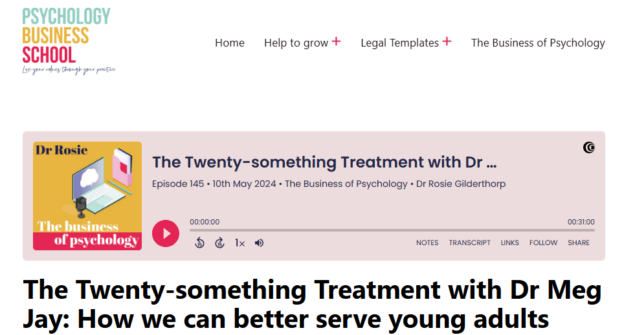Discover why your twenties are a defining decade and how to navigate its challenges with insights from Dr Meg Jay and Rosie Gilderthorp. From embracing uncertainty to balancing mental health in a social media age, this article offers actionable advice for young adults and therapists alike. Dr Meg Jay and Rosie Gilderthorp’s conversation offers a compelling roadmap for navigating the complexities of the twenties, emphasizing the importance of growth, resilience, and intentionality during this pivotal decade.
In a compelling conversation, The Twenty-something Treatment with Dr Meg Jay: How we can better serve young adults, Dr Meg Jay, developmental clinical psychologist and author, and Rosie Gilderthorp, psychologist and blogger, explored the unique challenges and opportunities people in their twenties face. Dr Jay, whose work focuses on the significance of this formative decade, shared her insights on uncertainty, mental health, and personal development. The discussion also touched on social media’s impact, writing practices, and practical advice for therapists and individuals navigating this stage of life.
Key Points from the Discussion
Here are the key takeaways from Dr Meg Jay’s conversation with Rosie Gilderthorp.
- The Twenties as a Defining Decade:
- The twenties are a critical period for major life decisions about work, relationships, and identity.
- Uncertainty during this stage often triggers stress and anxiety but also provides an opportunity for intentional growth.
- Uncertainty as a Core Theme:
- The unpredictability of careers, relationships, and finances is the primary stressor for twentysomethings.
- Therapists should normalize these experiences rather than pathologize them prematurely.
- Social Media’s Dual Impact:
- While it fosters connection and education, social media amplifies unhelpful comparisons, causing “compare and despair.”
- Young adults should evaluate how social media serves them and consciously curate their digital environments.
- Labels and Pathologizing:
- Many young adults self-diagnose or embrace labels for certainty, but therapists should contextualize behaviours developmentally rather than diagnostically.
- Over-diagnosing can hinder self-discovery and personal growth.
- Advice for Therapists:
- Understand the backdrop of uncertainty and avoid rushing to medicalize common developmental struggles.
- Emphasize strengths and normalize challenges.
- Personal Development for Clinicians and Writers:
- Clinicians should remain connected to their “why” by working with clients and staying inspired.
- For aspiring writers, Dr. Jay emphasized creating routines, seeking feedback, and embracing “shitty first drafts.”
- Vision for the Future:
- Dr. Jay intends to expand her reach through books, social media, and potentially podcasts, emphasizing accessible mental health education for twentysomethings.
Summary of Key Advice
Explore the actionable advice shared by Dr. Meg Jay to help twentysomethings and therapists navigate the uncertainties of this pivotal decade.
- For Twentysomethings:
- Embrace uncertainty as a normal and transformative part of life.
- Focus on being intentional in decision-making about relationships, careers, and habits.
- Use social media consciously; assess its impact on your well-being.
- For Therapists:
- Normalize developmental challenges and avoid unnecessary diagnoses.
- Help young adults find strength in their abilities rather than in diagnostic labels.
- Contextualize struggles within the broader framework of identity development.
- For Writers and Clinicians:
- Dedicate time daily to writing or creative pursuits, even amidst a busy schedule.
- Seek community support, such as writing groups, for accountability and feedback.
- Stay inspired by engaging directly with the source of your passion.
Critique of the Discussion
Gain insights into the strengths and areas for improvement in this compelling conversation.
- Strengths:
- The dialogue effectively highlighted the twenties’ importance as a transformative decade and provided actionable insights for individuals and clinicians.
- Dr. Jay’s emphasis on contextualizing mental health challenges is a refreshing counterpoint to the trend of over-diagnosis.
- The conversation balanced personal anecdotes with professional insights, making it relatable and informative.
- Areas for Improvement:
- While technology’s impact on mental health was discussed, the conversation could have delved deeper into specific strategies for mitigating its negative effects.
- The critique of social media corporations lacked a strong stance, which could have added depth to the discussion on systemic influences on mental health.
- Although practical advice for writers was included, the discussion could have provided more concrete steps for psychologists transitioning to broader public engagement.
Conclusion
Dr Meg Jay and Rosie Gilderthorp’s conversation provides an invaluable guide to navigating the complexities of the twenties, emphasizing the transformative power of growth, resilience, and intentionality. For those inspired by these insights, Dr Meg Jay’s books, The Defining Decade and The Twentysomething Treatment delve deeper into the challenges and opportunities of young adulthood. To explore more of her work, including her TED Talk and practical advice, visit www.megjay.com.
